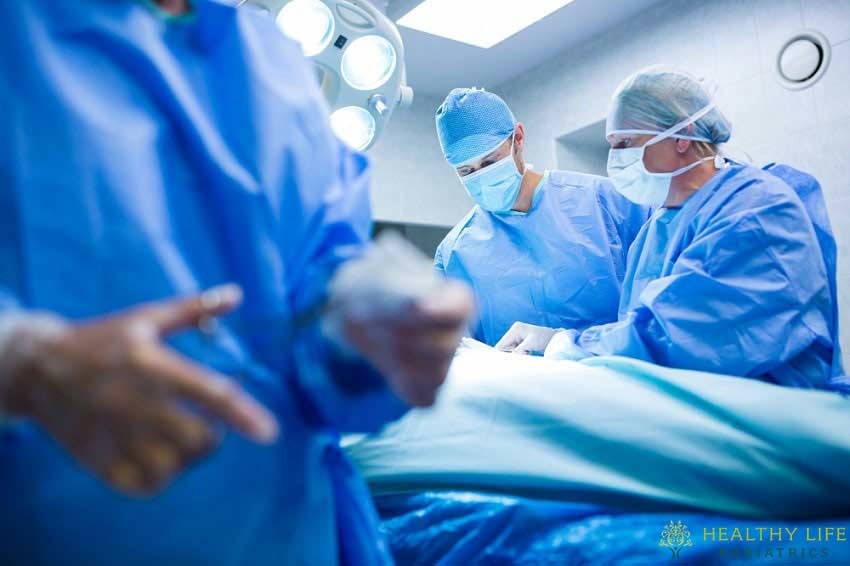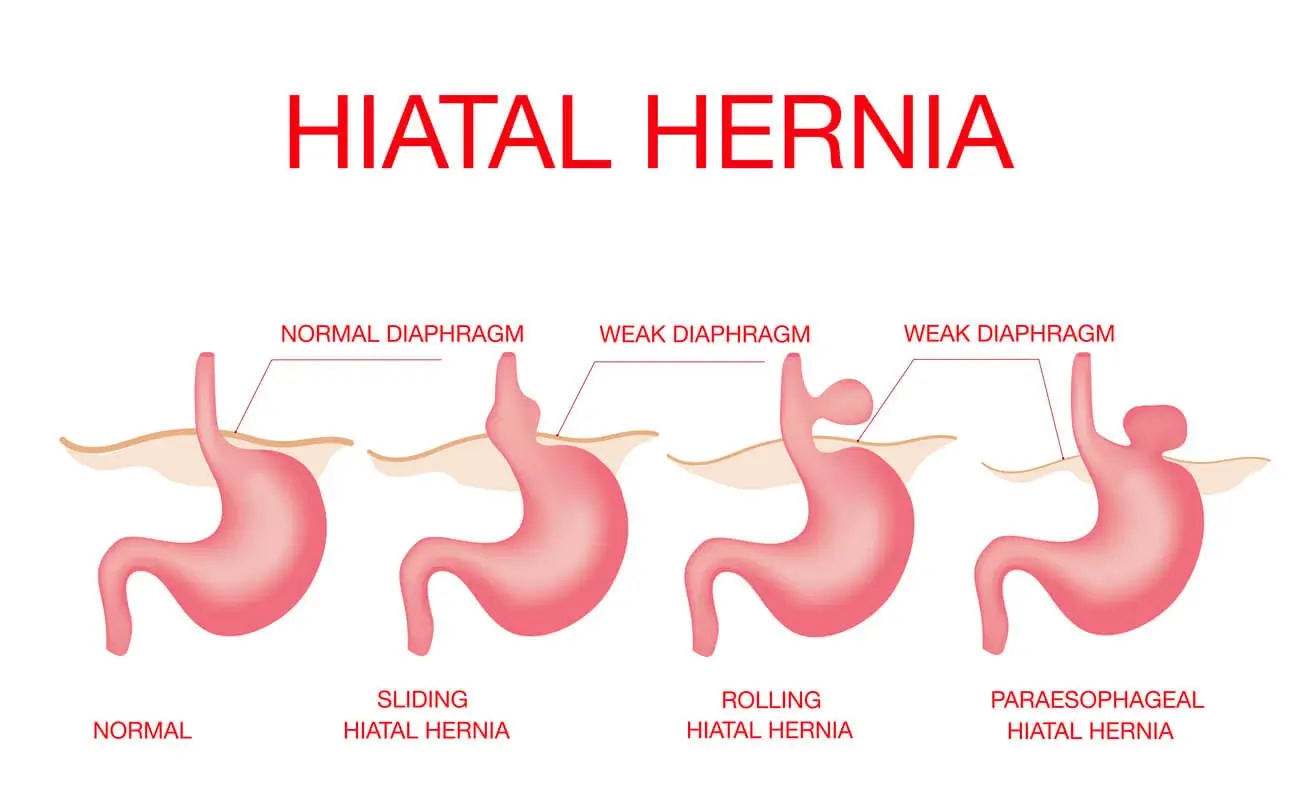Comprehensive Hiatal Hernia Surgery Los Angeles: Relief You Deserve
A hiatal hernia occurs when a portion of the stomach protrudes into the upper chest area. Hiatal hernia surgery is recommended when severe symptoms are present, or the hernia is likely to cause complications.
What are the Symptoms of a Hiatal Hernia?
Hiatal hernias often present no symptoms, making treatment unnecessary. Mild symptoms can manifest, such as heartburn, gastroesophageal reflux disorder (GERD), and acid reflux. You can sometimes treat these symptoms with lifestyle changes or medications.
When is Surgery Recommended for a Hiatal Hernia?
If your symptoms become severe, you should schedule a consultation with Dr. Moeinolmolki for hiatal hernia surgery. Severe symptoms are those that interfere with your quality of life. You may experience ulcers or a narrowing of your esophagus (food pipe), also called an esophageal stricture.
In many cases, your symptoms may not respond to other treatments. Heartburn medication may also do nothing for you, which might bring you to the hernia surgeon's office.
In severe cases, the tissue protruding through the muscle wall becomes strangulated, starving it of its blood supply. This can be fatal and requires emergency hiatal hernia surgery.
How Does Dr. Moein Perform Hiatal Hernia Surgery?

Dr. Moeinolmolki offers two types of surgery for hiatal hernia repair: open surgery, Nissen fundoplication (keyhole surgery), and endoluminal fundoplication.
For both procedures, you will be placed under general anesthesia for your comfort and safety.
Open Surgery
Open surgery is the traditional method for repairing a hiatal hernia. A large incision is made in the abdomen so that Dr. Moein has access to the hernia.
Dr. Moein will pull the stomach tissue back through the hole it emerged through. The upper portion of the stomach (called the fundus) gets wrapped around the bottom portion of the food pipe, creating a sphincter responsible for keeping stomach acid from regurgitating into the food pipe (acid reflux).
When the stomach requires extra fortification to prevent future hernias, Dr.Babak Moein inserts a special tube that keeps the stomach in place. The tube is temporary; the surgeon will remove it after several weeks.
Nissen Fundoplication (Keyhole Surgery)
Nissen fundoplication is the most common surgery performed for the hiatal hernia.
The procedure involves keyhole surgery, which is minimally invasive and only requires a few incisions around the treatment site.
Dr. Moein inserts a laparoscope, which is a lighted camera that illuminates and transmits the contents of your abdomen to a nearby screen. Dr. Moein uses the screen to manipulate the laparoscopic tools inserted through the “keyhole” incisions. Once the tools are inserted, Dr. Moein repositions the stomach, fortifies the muscular structure of the abdominal wall, and sews up the incisions.
This minimally invasive technique has a lower risk of infection, less discomfort, reduced scarring, and shortened recovery time compared to other surgeries.
With Dr. Moein’s expertise and use of advanced technology, you can be assured that your procedure will be safe and successful.
Hiatal Hernia Mesh Repair:
In some cases, surgeons may use mesh to reinforce the repair and provide additional support. Mesh repair is mainly considered in large or recurrent hiatal hernias to minimize the risk of recurrence.

Advanced Hiatal Hernia Surgery Los Angeles for Lasting Comfort
Robotic-Assisted Hiatal Hernia Repair:
Like other hernia surgeries, robotic-assisted techniques are gaining popularity in hiatal hernia repair. The precision and skill offered by robotic systems enhance the surgeon's ability to navigate intricate spaces, contributing to improved outcomes(4).
Magnetic Sphincter Augmentation:
A novel approach involves using a magnetic device to augment the lower esophageal sphincter, preventing acid reflux. This technique offers an alternative for patients seeking relief from hiatal hernia symptoms(5).
How Long is Recovery from Laparoscopic Hiatal Hernia Surgery?
Most patients go home the same day following laparoscopic hiatal hernia surgery. You may stay overnight in the surgical center if you require additional time to recover from anesthesia.
You may feel some discomfort in your abdomen and chest immediately following surgery. Some patients may also have difficulty swallowing. These side effects usually pass within 48 hours.
You should be back to your routine within six weeks.
**Early Recovery – First Week**
- Going home the same day or after overnight monitoring
- Using oral pain medications for surgical site soreness
- Walking around starting day 1 to prevent blood clot risks
- Cleaning incision sites with soap and water
- Removing surgical glue, tapes, or visible stitches at 7-10 days
**Middle Weeks 2-4**
- Having temporary bruising, swelling, numbness resolve
- Increasing activity as tolerated while avoiding lifting >25 lbs
- Driving once off narcotic pain pills and able to react normally
- Returning to deskwork jobs within 1-2 weeks if comfortable
- Still avoiding straining with constipation or heavy exercise
**Late Months 1-3**
- Having internal and external tissues finish strengthening
- Typically clearing for full activity without restrictions
- Building back muscle tone and exercise stamina
- Resuming strenuous workouts, lifting, sexual activity
Dietary Guidelines for Hiatal Hernia Recovery:
A well-managed diet plays a crucial role in recovery after surgery. Patients are often advised on specific dietary modifications to minimize reflux and promote healing(6).
Managing Pain and Discomfort After Hiatal Hernia Surgery:
Understanding and implementing effective pain management strategies post-surgery is key to a smooth recovery process. This includes medication and other non-pharmacological approaches(7).
Lifestyle Changes for Hiatal Hernia Relief:
Adopting lifestyle changes, such as maintaining a healthy weight, elevating the head of the bed, and avoiding trigger foods, can contribute to long-term relief from hiatal hernia symptoms.
Do You Need to Make Changes Following The Hiatal Hernia Surgery?
You will need to follow a special diet following hiatal hernia repair surgery. Dr. Moein will advise you to drink clear liquids immediately following the surgery, whereby you will move to soft and liquified foods the following day. Soft and liquified foods include mashed potatoes, soups, and smoothies. During this time, try to avoid foods that cause bloating and gas.
Dr. Moein will also advise you to eat small meals throughout the day rather than three larger meals. Most people return to their regular diet and routine within six weeks.
Even after full recovery, Dr. Moein will recommend that you continue to limit or avoid foods that contribute to bloating, gas, and acid reflux. These foods include citrus fruits, tomato products, acidic foods, beans, lentils, alcohol, corn, carbonated beverages, and cruciferous vegetables (broccoli and cauliflower).
What is the Effect of Hiatal Hernia Surgery Los Angeles, CA?

Keyhole surgery (Nissen fundoplication) is a safe and effective technique for relieving hiatal hernia. This surgery also treats symptoms of GERD. The surgery has a high rate of success with low rates of occurrence.
Are There Risks to Hiatal Hernia Surgery?
All surgeries come with risks. The risks of laparoscopic hiatal hernia surgery include infection, organ injury, and bleeding.
The risk with laparoscopic surgery is lower than with open surgery. There is also a risk of complications after hiatal hernia surgery, which can include diarrhea, difficulty breathing, nausea, and difficulty belching.
You can lower your risks further by putting effort into finding the best general surgeon. Dr. Babak Moeinolmolki of Healthy Life Bariatrics has decades of elite training and experience as a general, bariatric, and cosmetic surgeon. Dr. Moein has performed hernia repair surgery on patients all over the world. When you choose our accredited surgical center, you know you're in good hands with Dr. Moein as your hiatal hernia surgeon.
Book your consultation for Hiatal Hernia Surgery Los Angeles, CA, Today
Hiatal hernias often don't cause symptoms. If symptoms are present, you can sometimes treat them with lifestyle changes. When living more healthily fails to work, surgery is your only recourse.
Hiatal hernia repair surgery can give you long-term relief from hernia symptoms, acid reflux, and GERD.
Learn more by calling Healthy Life Bariatrics, home of world-class general surgeon Dr. Babak Moeinolmolki, to schedule a consultation – (310)861-4093.

